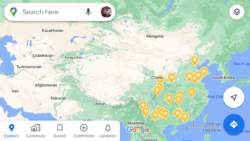Teaching Sexuality Education in China – Reflection by a Sociologist
IN this post, Chong Liu reflects on her experience of researching and teaching sexuality education in China. She states that the existing institutional challenges are being surmounted through the agency and actions of individual social actors.
I got up early one day in December 2020 to teach an online sexuality education class to students at a middle school in China, close to the border of Vietnam. The lesson would focus on Gender Equality, Love and Sexual Violence.
As I was about to start, the schoolteacher appeared in front of the camera, waved his hand, and suggested that I waited. I unmuted them as I wanted to know what was happening there, then realised that the principal wanted to give a short speech before I started. I thought it might be boring, so I tried to manage my facial expression to make me look interested. However, he surprised me when he said: “I agree with the value of this sexuality education programme. As it describes, sexuality is with us from our birth to our death, and from the womb to the tomb. Therefore, it is unnecessary to feel shame when we talk about sexuality.”
In my previous classroom encounters, I was shocked by some of the teachers who would not accept my direct approach to sexuality education. They even rated me poorly and suggested that I should not use plain and unequivocal terms to talk about contraception and sexual health. But it was different on this occasion. After I concluded the teaching, the principal, again, impressed me: "Miss Liu just talked about romantic relationships with you. It seemed that you were all interested in this topic. I believe that some teachers are wondering if it is too early to talk about it. From my point of view, a lot of things in our lives, not only romantic relationships, need to be experienced and studied.”
Since the beginning of 2019, I have taken part in a live-streamed sexuality education programme as a volunteer teacher. By the end of 2020, I had taught over 10,000 Chinese primary school, middle school, and high school students. The programme is conducted by You&Me, a sexuality education provider co-developed by Marie Stopes International China and UNFPA China. The project is modelled on the comprehensive sexuality education programme advocated by UNESCO.

The spots highlighted in this map are the locations of the schools where I have taught.
As depicted in this map, being able to teach sexuality education by using digital tools has enabled me to teach students across the country - from a high-end international high school in the eastern coastal area to a rural school in the southwest mountainous areas close to the border. As a sociologist in this field, I have become keenly aware of the negative impact of the unequal distribution of educational and societal resources on the sexuality education of youth and their everyday experiences.
I still remember my encounter with a schoolteacher at a rural middle school in the southwest of China. The teacher asked me if it was possible to tell more about contraception and domestic violence. I was inquisitive, so I asked her why she had that idea. She then told me that many students in her school would not continue their education once they left middle school. Another school experienced a power failure whilst I was teaching. Compared to students with much better conditions and more opportunities in the high-end international school that I mentioned above, my sociological perceptiveness has become sensitive to how inequalities have impacted the practice of sexuality education.
As a sociologist, I research sexuality education and social stratification. Specifically, I investigate youth sexuality education experiences, and how class and gender influence their relationships and their understanding and practice of sexuality. It is worth mentioning that in 2017, Li Keqiang, the current Premier of the State Council of the People's Republic of China, expressed the ambition to achieve the modernisation of education nationwide by 2030 (Zhao and Liu, 2017). In line with that ambition, China's central government has invested massively in multi-media facilities in schools and in optimising learning methods and curriculum design (Deloitte China, 2018:12). According to Deloitte’s report on China's education development, approximately 60% of general classrooms had been equipped with multi-media facilities as of 2017. The development has resulted in new problems that resonate with Bauman’s (1998) thoughts in his book Globalisation: “Some of us become fully and truly ‘global’; some are fixed in their ‘locality’ – a predicament neither pleasurable nor endurable in the world in which the ‘globals’ set the tone and compose the rules of the life-game.” (p.2)
The unequal distributions do matter. However, centring on one of the most vital sociology discussions, it is crucial to look at the autonomy and agency of the individual. The institutional inequalities have indeed set barriers that obstruct the practice of sexuality education. On the other hand, echoing the school principal that I quoted earlier, I am confident these barriers can be eliminated, or minimised, through the positive actions of individuals.
More information about the live-streamed sexuality education programme is available on Bilibili. The videos have English and Chinese subtitles.
References
Bauman, Z. (1998). Globalization: The Human Consequences. New York, NY: Columbia University Press.
Deloitte China. (2018). A New Era of Education: China Education Development Report 2018. [Online]. [Accessed 6 January 2021]. Available from: <https://www2.deloitte.com/content/dam/Deloitte/cn/Documents/technology-media-telecommunications/deloitte-cn-tmt-china-education-development-en-report-2018.pdf>
Zhao, X., and Liu, B. (2017). 李克强总理在政府工作报告中强调办好公平优质教育 [Premier Li Keqiang Stressed to Achieve Good and Equal Education through the Report on the Work of the Government]. [online] [Accessed 5 March. 2020] Available at http://www.moe.gov.cn/jyb_xwfb/s6052/moe_838/201703/t20170306_298303.html
***********
Chong Liu is a PhD student in the School of Sociology and Social Policy at the University of Leeds. She is currently researching sexuality education and social stratification in contemporary China. You can reach her at SSCL@leeds.ac.uk
